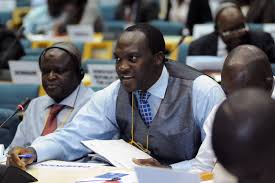
“Our role as conservators is to send them (those taking refuge in forests as a result of the current Anglophone crisis) out of any protected areas, but as humans, we understand that they are like refugees and during crises, conservation is really difficult; without peace, there is no development, without peace, there is no conservation,” the Sub-Director of Wildlife and Protected Area at the Ministry of Forestry and Wildlife, Njiang Antoine, said in an interview he granted The Green Vision recently.
The Sub-Director cried foul over the possible deteriorating effect those taking refuge in the forests will have on the biodiversity of the area. “When there is insecurity, there is definitely no security for human and wildlife. During social insecurity, our wildlife in protected areas are used as food, bushmeat; trees are cut down for wood and construction of huts by those that are refugees inside our protected area. As a conservationist, I know that when they will stay there for one week, they will not have anything to eat and will become poachers. What do you think will happen to our wildlife?” he questioned.
This status quo has placed conservationists at the dilemma of whether or not to risk human life for the realization of conservation goals. “It becomes very difficult to put down a strategy to combat them because they will be everywhere in the forest, and sometimes you will not know what to do because they are killing these animals not because they like it but because they want to survive. Will you leave them to continue killing our animals like that, will you send them away and allow them to die of starvation? These are difficult situations” Mr. Njiang stated.
Though caught between the devil and the deep blue sea, the conservationist, however, thinks it is more preferable for the villagers to reside in the bushes. He recommended that the root cause of the problem be addressed given that sending the people out of the forest will only cause more harm than good. “What I think is that we need to first all address is the root cause of what is sending them out of their homes into bushes. They were claiming for many things and without a reaction, some of them started behaving like terrorists and when the military retaliated, they started running into bushes and out of the country. So there is a need for a global solution to this problem,” he recommended.
The Sub-Director of Wildlife and Protected Area at MINFOF underscored the need for the Government to dialogue with the people of the two English speaking regions of Cameroon to understand what they want and arrive at a consensus so the refugees will leave the forests and the country’s biodiversity conserved.
By Shancho Ndimuh







